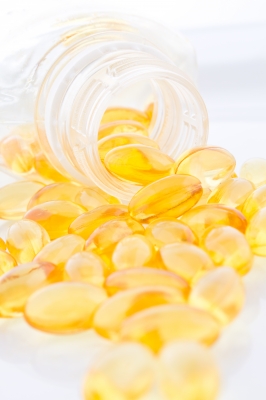What supplements can improve heart health and prehypertension?
 Dr. Britt Burton-Freeman is Director, Center for Nutrition Research, Institute for Food Safety and Health, Illinois Institute of Technology; Associate Research Nutritionist, UC Davis. Her research involves obesity and vascular disease inflammatory and oxidative stress responses. Her research approach includes human and basic science methodology.
Dr. Britt Burton-Freeman is Director, Center for Nutrition Research, Institute for Food Safety and Health, Illinois Institute of Technology; Associate Research Nutritionist, UC Davis. Her research involves obesity and vascular disease inflammatory and oxidative stress responses. Her research approach includes human and basic science methodology.
Dr. Burton-Freeman has shared with us information on supplements and their effectiveness for improving heart health.
Fish oil omega 3 fatty acids
Studies investigating fish oil omega-3 fatty acid supplementation have shown improvements in CVD risk factor reduction. Specifically, fish oil omega-3 fatty acids aid in lowering triglycerides in the blood and help raise HDL. Fish oil omega-3 fatty acids also help to reduce inflammation and are also involved in platelet function, reducing blood clotting time. Hence, too much fish oil can increase the risk of bleeding and hemorrhagic strokes. Elevated blood pressure is another risk factor for CVD. High doses of omega 3 fatty acids have been shown to lower blood pressure in people with hypertension. Consuming > 3 g of fish oil omega 3 fatty acids is advised only under the advice and monitoring of a physician.
Lycopene
Continue reading
Eating Red Meat Increases Heart Disease AND Cancer Risk

Red meat and processed meats are connected to cancer according to the World Health Organization (WHO).
Researchers noted in 2014 studies indicating a high consumption of red meat or processed meat to slightly increase cancer risk. Therefore, the International Agency for Research on Cancer (IARC, a part of WHO) decided to evaluate red meat and processed meat to provide solid scientific evidence regarding cancer risk and red meat/processed meat consumption.
Processed meats: carcinogenic to humans
Processed meats are meat products produced by salting, fermenting, curing, smoking, or other technique to enhance preservation and flavor. Some examples of processed meat include hot dogs, sausages, ham, beef jerky, salami, corned beef, pepperoni, spam, and bologna.
The IARC classified processed meats as Group 1, carcinogenic to humans. This means there is enough evidence to support processed meat as cancer causing.
Tobacco smoking and asbestos are also classified as Group 1. However, the IARC is careful to clarify this does not mean processed meat is equally as dangerous to your health as tobacco smoking and asbestos. The group classifications only indicate strength of scientific evidence, not degree of risk.
Red meats: probably carcinogenic to humans
Red meat includes beef, pork, veal, and lamb. The IARC classified red meat as Group 2A, probably carcinogenic to humans. Red meat studies were more limited than processed meat studies, but did show an association between red meat consumption and colorectal cancer. However, current studies cannot rule out other potential explanations for the increased cancer risk. Therefore, classified as Group 2A, probably carcinogenic. In addition to colorectal cancer, an association was seen between red meat consumption and stomach cancer…but again, no conclusive evidence.
High temperature preparation and carcinogens
Omega 3 & Common Fish Oil Myths

Have you had a chance to review some of the Omega 3 information I’ve shared? If not, here are links to some resources:
How much omega 3 do you need to lower cholesterol?
Top Omega 3 Sources to Lower Cholesterol
Now, let’s get a another point of view from Dr. Fred Sancillio.
Dr. Sancilio is a development scientist. He has published over 20 articles in peer-reviewed scientific journals and has presented to scientists in conferences around the world. He started his career as a physical and analytical chemist in the Research Division of Hoffmann-LaRoche, Inc. Dr. Sancilio earned his M.S. and Ph.D. degrees in Physical and Analytical Chemistry from Rutgers University.
According to Dr. Sancilio, if you take a fish oil supplement to help lower your LDL cholesterol, you’re wasting your money. The same may hold true if you think there’s not much difference between the various types of fish oil and omega-3 supplements on store shelves except perhaps the capsule sizes (and the size of the smelly, fishy belches some cause after you take them).
So, let’s dive into a Q & A discussion different aspects of omega 3 and what Dr. Sancilio refers to as myths…
Omega 3’s: Should You Stop Taking Fish Oil Supplements?
 On July 11, 2013 research results from Brasky et al. were published online in the Journal of the National Cancer Institute. The concluded that high blood concentrations of omega 3 fatty acids were linked to increase prostate cancer risk. Researchers state these results support their 2011 findings that omega 3 fatty acids play a role in prostate cancer.
On July 11, 2013 research results from Brasky et al. were published online in the Journal of the National Cancer Institute. The concluded that high blood concentrations of omega 3 fatty acids were linked to increase prostate cancer risk. Researchers state these results support their 2011 findings that omega 3 fatty acids play a role in prostate cancer.
In the few weeks since this study was published, many doctors and researchers have weighed in with their viewpoints on the study results. Let’s sift through all the information and focus on what you need to know so you can decide if you should continue supplementing omega 3 fatty acids or not.
The Study
This study, released by the Fred Hutchinson Cancer Research Center, analyzed participant data from the Selenium and Vitamin E Cancer Prevention Trial (SELECT). SELECT was a large randomized, placebo-controlled trial to test whether selenium and vitamin E reduced prostate cancer risk. SELECT was not a double-blind placebo controlled trial focused on omega 3’s and prostate cancer. Participants in SELECT had their omega 3 levels measured. It was the plasma phospholipid omega 3 levels of 834 men who developed prostate cancer and 1393 men who did not develop prostate cancer that was analyzed for this most recent research linking omega 3’s to prostate cancer.
Cardiologist Dr. Stephen Sinatra points out valid concerns regarding vitamin E and its pro-oxidative effect on cholesterol. Oxidation causes the production of free radicals, which increases health concerns (ie cancer, heart disease, etc.). In SELECT, participants received 400 IU of dl-alpha tocopherol (one form of vitamin E). Many would argue that supplementing high levels of one form of vitamin E is associated with its own negative health consequences. Sharing this to show that the data analyzed from SELECT may have been ‘contaminated’ by the vitamin E supplementation which can impact results. Also, keep in mind that some participants were on prescription medications, were smokers, regularly drank alcohol, were overweight/obese, and/or had a first-degree relative with prostate cancer…all of which impact prostate cancer risk.
Omega 3 Levels
Here are the plasma omega 3 levels and the cancer risk found in this research:
Here's another omega 3 option – Calamarine
The typical American diet tends to be low in omega 3 fatty acids, approximately 120 mg DHA/day, which is an omega 3 supplement may be beneficial. Some benefits omega 3’s have been linked to improvement in arrhythmias, blood pressure, lipoprotein(a) levels, arterial inflammation, HDL cholesterol, and endothelial function.
Fish oil is a very common source individuals choose to supplement to boost their intake of omega 3 fatty acids. Tuna, salmon, sardines, herring, and anchovies are common fish used for the production of fish oil supplements. Fish oil tends to have equal levels of EPA and DHA or in some cases may be slightly higher in EPA content.
A New Option
A new option produced by Pharma Marine Group is Calamarine. Calamarine is obtained from calamari, or squid, and contains higher levels of DHA. The company is also able to market Calamarine as “eco-friendly” because squid have a brief life cycle, breed rapidly, and are not endangered. Especially important with concerns regarding over-harvesting of our marine life, which fish oil production may play a part.
Heart Health – Is fish oil safe?

Fish oil supplements are a great alternative for people that do not eat fish often to boost their omega 3 intake and promote heart health.
There’s been some media speculation about possible contaminants, such as mercury, within fish oil supplements. However, good news if you supplement fish oil, there are minimal contaminants within the supplements!
There have been several studies, specifically a report by ConsumerLab.com and Harvard Medical School, finding no mercury or PCBs within over 40 popular fish oil supplements. Fish oil is typically taken from fish, such as cod and sardines, that do not contain high levels of mercury. Also, many manufacturers distill the fish oil to remove contaminants.
All the best,
Lisa Nelson RD
Image courtesy of Praisaeng / FreeDigitalPhotos.net



